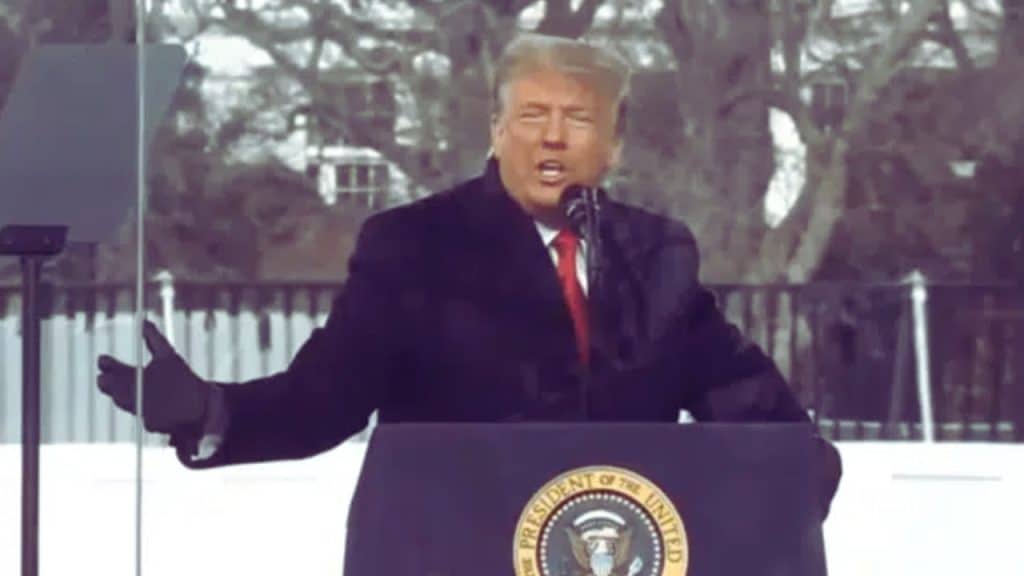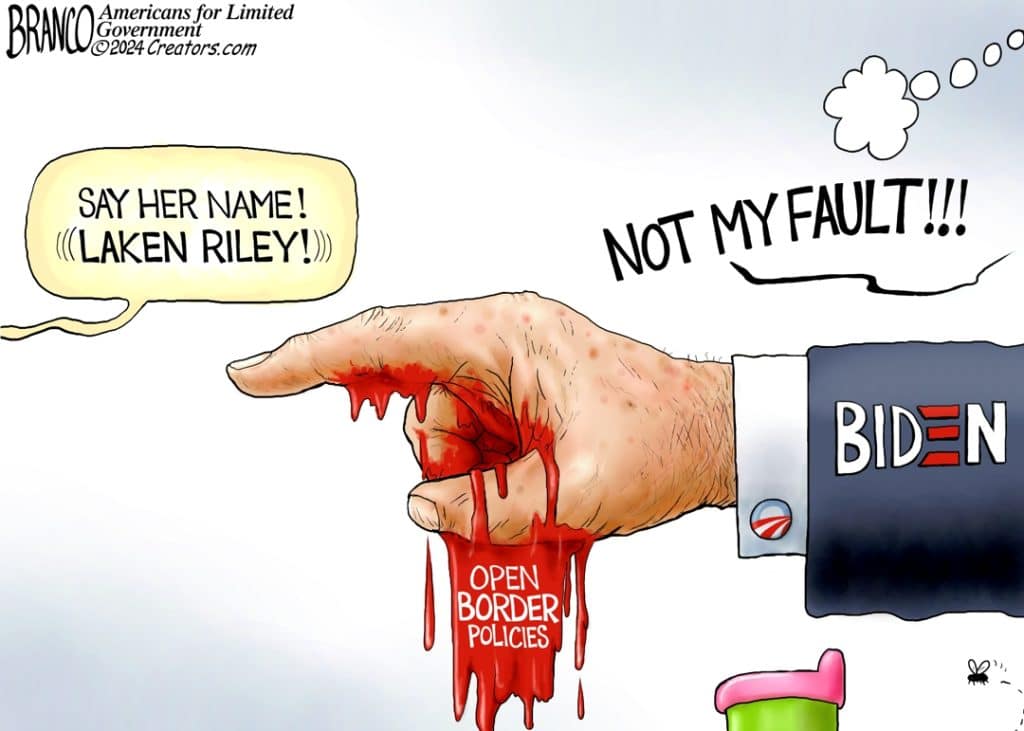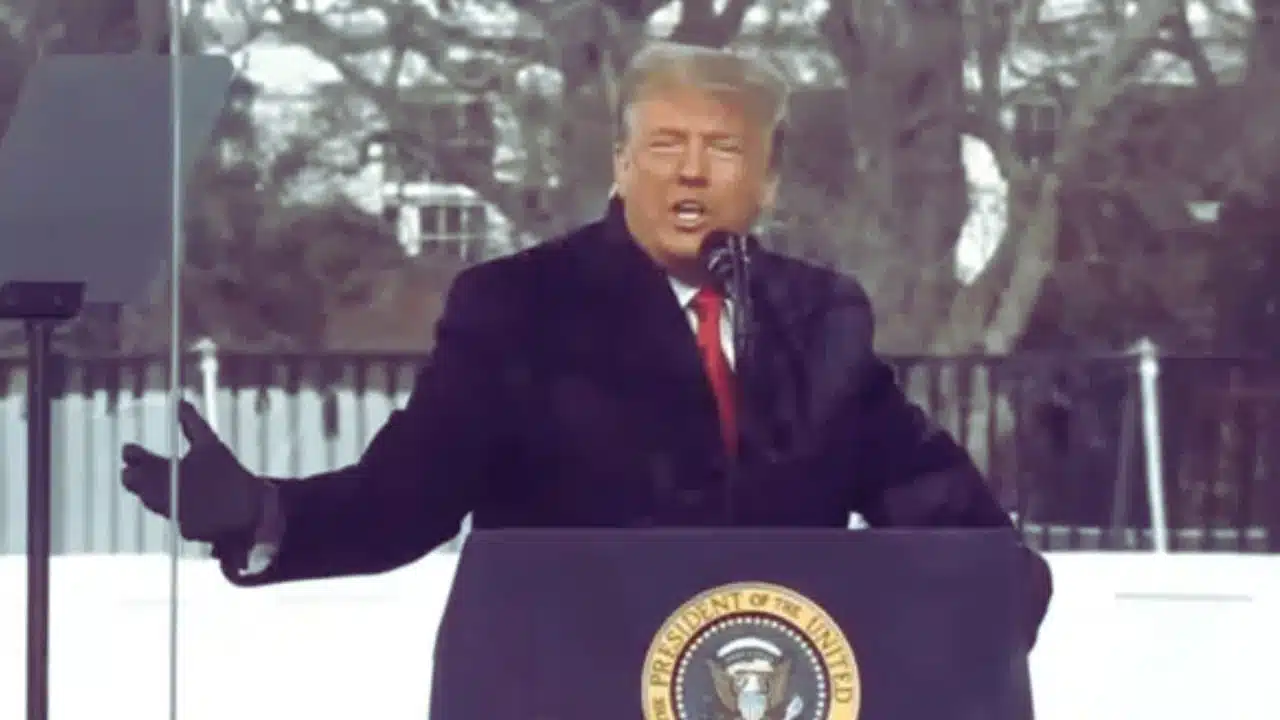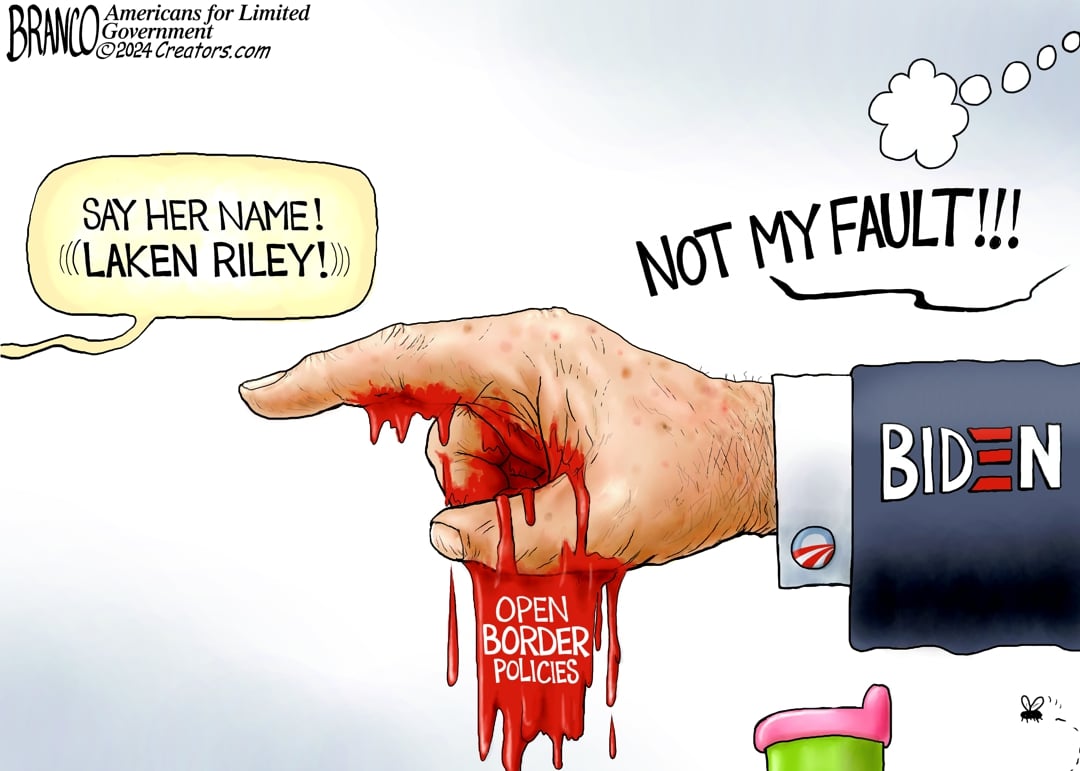February 29, 2024
Permission to republish original opeds and cartoons granted.
Supreme Court expedites consideration of whether presidents can be prosecuted for executing their Article II powers, but what about their First Amendment rights?

By Robert Romano
The Supreme Court on Feb. 28 granted a motion by Special Counsel Jack Smith to treat former President Donald Trump’s request for a stay of a ruling from the D.C. Circuit Court of Appeals pending an en banc hearing as a petition for a writ of certiorari in the case of whether Trump can prosecuted for what Trump says was the exercise of his official duties as President before he left office Jan. 20, 2021.
Now, there will be no en banc hearing, and the case will proceed to the Supreme Court on an expedited basis, per the Court’s grant, with all briefs due by April 15 and oral arguments set for April 22: “The case will be set for oral argument during the week of April 22, 2024. Petitioner’s brief on the merits, and any amicus curiae briefs in support or in support of neither party, are to be filed on or before Tuesday, March 19, 2024. Respondent’s brief on the merits, and any amicus curiae briefs in support, are to be filed on or before Monday, April 8, 2024. The reply brief, if any, is to be filed on or before 5 p.m., Monday, April 15, 2024.”
The case will determine to what extent presidents can be prosecuted for executing their Article II executive powers under the Constitution, answering the question: “Whether and if so to what extent does a former President enjoy presidential immunity from criminal prosecution for conduct alleged to involve official acts during his tenure in office.”
In Trump’s initial brief asking for the stay—the Court in granting certiorari rendered the stay moot by instructing the lower court to hold off on proceedings until the Supreme Court renders a judgment—his lawyers outlined the conduct for which he was charged that they say fell within the President’s duties, arguing he had the power to investigate claims of election fraud in 2020 and then to communicate to the executive branch, the legislative branch and the states his position on those questions.
First, addressing the federal indictment, Trump says he communicated using official channels “matters of paramount federal concern” with his election fraud allegation: “using official channels of communication, made a series of tweets and other public statements on matters of paramount federal concern, contending that the 2020 federal election was tainted by fraud and irregularities that should be addressed by government officials.”
Second, Trump also communicated these concerns to the Justice Department: “President Trump communicated with the Acting Attorney General and officials at the U.S. Department of Justice—which he oversaw as an integral part of his official duties as chief executive—about investigating suspected election crimes and irregularities, and possibly appointing a new Acting Attorney General.”
Third, Trump similarly communicated these concerns to states: “President Trump communicated with state officials about the administration of the federal election and urged them to exercise their official responsibilities in accordance with the conclusion that the 2020 presidential election was tainted by fraud and irregularities.”
Fourth, Trump communicated the same concerns to the Vice President and to Congress: “President Trump communicated with the Vice President in his capacity as President of the Senate, the Vice President’s official staff, and other members of Congress to urge them to exercise their official duties in the election certification process in accordance with President Trump’s contention that the election was tainted by fraud and irregularities.”
And fifth, then alternate slates of electors were convened for the Vice President and Congress to consider on Jan. 6, 2021: “other individuals organized slates of alternate electors from seven States to ensure that the Vice President would be authorized to exercise his official duties in the manner urged by President Trump... According to the indictment, these alternate slates of electors were designed to validate the Vice President’s authority to conduct his official duties as President Trump urged.”
Here, Trump is arguing that those were all things he had the power to do as president. Another element, though, that the Court will invariably need to grapple with is that even if Trump had not been the president, and was a presidential candidate who had lost the election, he still would have had a First Amendment right to challenge the outcome of the election in courts, to the Justice Department, to Congress and to the states.
Trump also asked the Court to consider the First Amendment implications of the criminal trial on the 2024 election, in which Trump is running for the Republican nomination and is easily winning so far, having swept Iowa, New Hampshire, Nevada, South Carolina and now Michigan. He’s won every contest so far.
Trump argued the trial itself would harm his First Amendment rights going forward: “The D.C. Circuit’s extraordinary decision to return the mandate to the district court to proceed to trial imposes another grave species of irreparable injury—the threat to the First Amendment rights of President Trump, his supporters and volunteers, and all American voters, who are entitled to hear from the leading candidate for President at the height of the Presidential campaign. The Special Counsel seeks urgently to force President Trump into a months-long criminal trial at the height of campaign season, effectively sidelining him and preventing him from campaigning against the current President to whom the Special Counsel ultimately reports, President Biden. This would impose grave First Amendment injuries on President Trump and all American voters, whether they support him or not, and threatens to tarnish the federal courts with the appearance of partisanship.”
In 2000 and 2016, election challenges by Al Gore and Jill Stein were never thought to be criminal matters, even though both failed to legally prevail in courts and in Congress in bids to overturn the outcome of those elections. Unquestionably, Gore and Stein had the First Amendment right to bring those petitions for a redress of their perceived grievances, even if they were ultimately found to be in the wrong.
So, yes, the Trump case could turn on whether the President had the power in his capacity as the executive to investigate the outcome of the election for potential fraud, but a broader element is to consider the First Amendment freedom to raise those challenges, whether as a sitting president or the leader of the opposition party. Even if there is no presidential immunity in this case, there is still the liberty to challenge the official acts of the government.
Robert Romano is the Vice President of Public Policy at Americans for Limited Government Foundation.
Cartoon: Collateral Damage
By A.F. Branco

Click here for a higher level resolution version.
To view online: https://dailytorch.com/2024/02/cartoon-collateral-damage/
If Energy Independence Matters, It Is Time To End Bio-Fuels Refining Credits

By Rick Manning
The Biden administration’s continued war on oil and American energy independence continues unabated, and just as the coal industry has been harmed more by the expectation by investors that new coal electricity generation could be shut down, our nation’s oil refining capacity is stalled for the same reason.
In June of 2022, Chevron CEO Mike Wirth noted in response to a question about the future of new oil refining that, “There hasn’t been a refinery built in this country since the 1970s." Wirth continued by opining, "I personally don’t believe there will be a new petroleum refinery ever built in this country again."
When the CEO of a major U.S. oil refiner rejects the notion of additional refining capacity being developed in the U.S. that should send major alarm bells to policy makers about our nation’s energy future.
Wirth further explained, "But what we’ve seen over the last two years are shutdowns. We’ve seen refineries closed. We’ve seen units come down. We’ve seen refineries being repurposed to become bio refineries. And we live in a world where the policy, the stated policy of the U.S. government is to reduce demand for the products that refiners produce."
He continued, "At every level of the system, the policy of our government is to reduce demand, and so it’s very hard in a business where investments have a payout period of a decade or more, and the stated policy of the government for a long time has been to reduce demand for your products."
A very dire assessment, which requires a complete redirection of our nation’s energy priorities over an extended period of time to attract the capitol and commitment necessary to expand oil capacity to meet minimal economic growth over the next two decades.
However, one part of Wirth’s statement is readily fixable – the repurposing of refineries to become bio refineries. These bio-refineries are where ethanol is blended, a heavily subsidized corn-based grain alcohol which is mixed with oil based gasoline. The federal Renewable Fuel Standard law mandates the production of bio-fuels rewarding refineries which make ethanol by awarding them credits, known as Renewable Identification Numbers (RIN), that serve as currency for the program. Produce lots of ethanol, get credits, which other refineries that produce other oil based fuel products like kerosene or jet fuel are required by the government to purchase.
Designed to create a market subsidy for the production of ethanol under the guise of making the fuels our cars burn less reliant on foreign oil, the artificial value of RIN credits have created cost pressures on smaller non-bio fuel oil refiners.
Over the past few years, the Government Accounting Office (GAO) and the Environmental Protection Agency (EPA) have been at war over the impact of RINs on small refiners. The GAO points to the increased burden this system places on small refiners, while not surprisingly, the EPA argues against changes to the program.
One thing that is clear is that the very purpose of the RINs program no longer exists. The program was set up to incentivize refiners to add bio-fuels to gasoline so that the non-existent bio-fuels refining industry could be jump started.
Now, due to a variety of government subsidies, the bio-refining sector is well-established, and presumably if it is market competitive, providing RINs credits for bio-fuel production is no longer needed.
As a result, Congress can agree or disagree with either the GAO or EPA on harm done by the RINs credit system, but they should all be able to agree that the bio-fuel refining industry no longer is dependent upon the government thumb on the scale that the credits represent.
What is needed, according to the Chevron CEO, is to expand our nation’s refinery capacity toward bio-fuels, and if we are going to be truthful, the transition of some refineries away from bio-fuel production.
It is time to end the RINs credit system, and let the bio-fuel industry compete in the marketplace. This would ensure that the market allocated the use of our currently hamstrung petroleum refining system to produce the fuels which America needs now, while policymakers attempt to unwind the regulatory morass which is preventing new, needed refineries from being built ensuring our energy independence for decades to come.
Rick Manning is the President of Americans for Limited Government.
To view online: https://dailytorch.com/2024/02/if-energy-independence-matters-it-is-time-to-end-bio-fuels-refining-credits/

McConnell’s exit clears way for Senate GOP to work to accomplish Trump agenda
Feb. 28, 2024, Fairfax, Va.—Americans for Limited Government President today issued the following statement on Senate Minority Leader Mitch McConnell (R-Ky.) stepping down from his Senate Republican leadership position in November:
“Senator McConnell’s decision to step down from his Senate Republican leadership post in November will hopefully embolden him and his staff to use these last few months to fight for a restoration of fiscal sanity, freedom and border security. Senator McConnell has an opportunity to at least partially restore his legacy by using his position to stop the flow of illegal aliens root and branch. If he instead chooses appeasement on the border, the budget and on Biden’s executive overreaches, it will cement his position as an establishment stumbling block against true reform. In the least, McConnell’s exit now clears the way for Senate Republicans to choose leadership who are going to work diligently to accomplish the Trump agenda in 2025.”
To view online: https://getliberty.org/2024/02/mcconnells-exit-clears-way-for-senate-gop-to-work-to-accomplish-trump-agenda/



